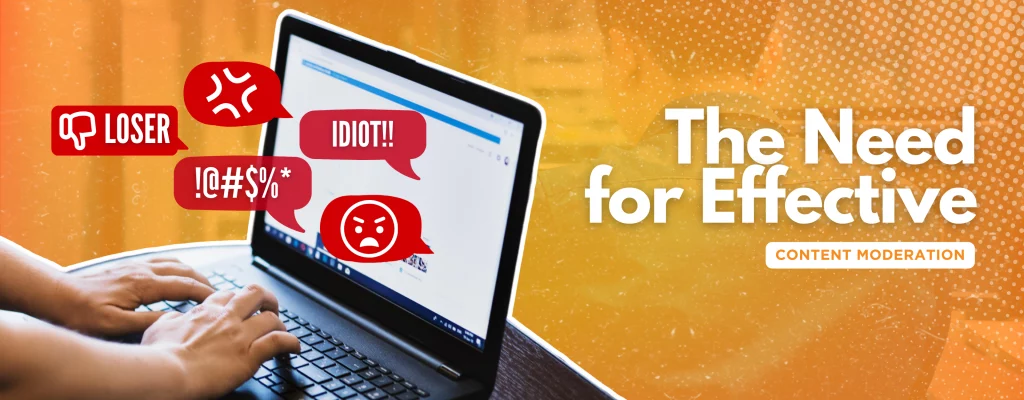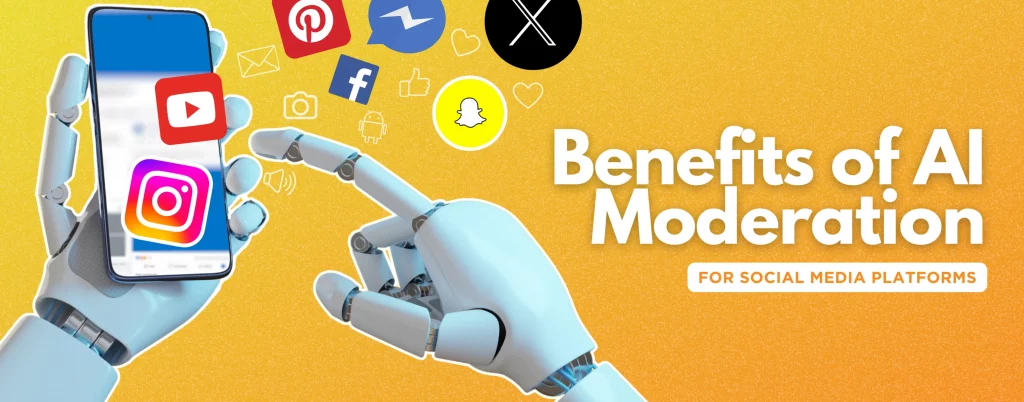Artificial intelligence (AI) has become the talk of the town in 2023. Its innovative and evolving technologies warranted limitless possibilities, from content management to safeguarding users and accommodating startups and large business enterprises. Not surprisingly, social media platforms turned to AI content moderation due to its benefits.
But before we delve into that, let’s first define what AI moderation is.
AI-powered content moderation refers to scanning and analyzing large amounts of social media content. With machine learning algorithms and other technologies such as Natural Language Processing (NLP), AI paved the way for automated content moderation, which automatically filters potentially harmful content. Its ability to moderate content in real-time is crucial to today’s fast-paced and malleable social media landscape.
Social media is a giant melting pot of user-generated content (UGC). Social media is a bottomless pit of different opinions, beliefs, and values, from texts and chats to images, videos, and multimodal content. However, social media’s meteoric rise is a double-edged sword.
On the one hand, it opened great opportunities, such as giving online brands and advertisers a platform. On the other hand, it evolved to the user’s detriment. It became a locus of misinformation and hate speech, among others.
In short, it is a delicate task to strike the perfect balance between these paradoxes, especially for humans with limited capabilities. However, AI for content moderation made a big difference. Let’s discuss.
The Need for Effective Content Moderation

From a simple chat room to a stand-alone virtual world, social media is unarguably the most dominant platform in the digital landscape today. However, as mentioned, social media’s continuous expansion birthed positive and negative consequences.
Unlike in school exams, real life is not right minus wrong. Thus, social media platforms must build on the positive while reducing the adverse outcomes. This is where social media moderators come into play.
What do social media moderators do?
They help enforce community guidelines and filter harmful content that poses online and real-life threats to the users.
Here is a list of harmful content often dealt with in social media moderation:
- Misinformation
This refers to the dissemination of inaccurate and misleading information in social media. Because social media platforms have been the main source of news and current events, they influence how people think and act. Thus, regardless of whether they are deliberate or unintentional, social media moderation is essential to eradicate the prevalence of misinformation.
- Hate Speech
Social media is a common ground for people with diverse cultural backgrounds. Thus, the proliferation of hate speech is something that needs constant moderation. Hate speech is an offensive and discriminatory remark that targets a person or group of people regarding their gender, color, and age, among others.
It is essential to combat blatant racism, sexism, and other forms of hate speech because they can alienate both existing and potential social media users.
- Cyberbullying
This is the sharing of harmful content that deliberately intends to threaten social media users. They often come in the form of mean, hostile, rude, and aggressive texts, chats, images, and videos. It is vital for social media moderators to shut down these kinds of content because they disrupt the user’s enjoyable and safe experience.
- Explicit Visuals
These include depictions of suicide, violence, sexual harassment, and more. Not only because these types of content are generally distasteful but also because they can cause disturbance to other users. Various social media platforms, such as Facebook and Instagram, employ auto-moderation to remove inappropriate content like these.
All in all, proper and thorough social media moderation is a necessity rather than a nice-to-have. Regulating user’s online interactions helps foster a safe and healthy social media landscape.
But the question is, how do we conduct content moderation in social media?
Traditional Approaches vs. AI-Powered Moderation

Content moderation generally refers to reviewing and monitoring online content to guarantee that it meets community standards and guidelines. It includes flagging and taking down potentially harmful content to uphold user safety.
The conventional approach to content moderation is manual moderation, where human moderators conduct manual review and keyword filtering to screen potentially harmful content. This approach is advantageous because humans can understand nuanced content better than computerized systems. Thus, they can generate more accurate moderation outcomes.
However, due to the exponential growth of users in social media, the human capacity to handle massive amounts of online data has become a liability. Unfortunately, more UGC highlights the need for more moderation.
However, this paradox was aided by AI's application in content moderation. AI technologies enabled automated moderation, automatically filtering unwanted and potentially harmful content. This approach allows for real-time content monitoring, which is vital in today’s fast-moving social media landscape.
In short, AI bridged the gap between human limitations and growing social media moderation needs. Here are two key components of AI that made that possible:
- Natural Language Processing (NLP)
NLP enables a system to understand the depths of human language. Thus, it powered AI moderation to flag potentially harmful content by filtering through its text.
- Machine Learning (ML)
Machine learning is the capacity of AI systems to analyze algorithms and recognize content patterns from training datasets. AI systems undergo massive data training to “learn” what content is appropriate and what is not. This capacity also allows AI to provide recommendations of relevant content tailored to the user’s preferences, which makes social media more engaging.
Benefits of AI Moderation for Social Media Platforms

AI has revolutionized the way we manage social media platforms. It addressed the limitations of human capacity and made the content moderation process simpler and faster.
Here is a quick rundown of how AI improved content moderation:
- Scalability
AI moderation efficiently manages an unparalleled volume of social media content with only minimal human input. In short, it allows platforms to moderate content at scale, crucial to keeping the social media landscape safe for all users.
- Consistency
Unlike the manual approach, AI moderation does not have human biases that can influence moderation outcomes. Thus, AI systems generate more consistent decisions because they read content in black and white. Consistency in moderation outcomes is essential to uphold fairness in the social media community.
- Cost-Effectiveness
AI moderation reduced the need for extensive human moderation teams. Thus, it offers cost savings for social media platforms without diminishing the efficiency of content moderation.
- Better User Experience
AI content moderation improves user experience in two ways.
First, it guarantees user safety by making the social media platform free from harmful content. Second, it can access user data, including preferences, browsing history, and more. This enables AI systems to tailor personalized user experiences by providing relevant content and recommendations that suit their tastes.
- Platform Reputation
Effective content moderation fosters a safer online environment, which significantly enhances user experience. And when users have an enjoyable experience, it reflects vastly on the platform. Thus, building and maintaining a good reputation boils down to how you manage your platform.
Ethical Considerations

Despite the benefits of AI-powered content moderation, it remains a constant subject of debate. The heart of ethical complexities surrounding AI moderation lies in the delicate task of balancing free speech and social responsibility. Because content moderation involves removing harmful content, too much and too strict moderation can be regarded as censorship or infringing on the right to freedom of speech.
More so, AI moderation is vulnerable to generating inaccurate results. This is the weakest link of AI moderation because it solely relies on data training and lacks contextual understanding. Thus, it is prone to commit errors when exposed to new and more complex datasets.
Challenges in AI Content Moderation

Just like any other thing in the world, AI content moderation has positive and negative implications. While we cannot say which outweighs which, it is essential to acknowledge the disadvantages of relying solely on AI moderation.
- Algorithmic Bias
One of the biggest drawbacks of AI moderation is its vulnerability to algorithmic bias. Because they rely solely on data training, they are prone to be inaccurate when exposed to biased datasets. These biases may include racial, gender, and ideological biases.
- Privacy Concerns
To tailor personalized user experience, AI algorithms train on large datasets that access user data. These data include their preferences and browsing history across social media pages. Thus, it raises concerns about user’s data privacy, particularly how these data are accessed, used, and stored.
- False Positives and False Negatives
AI moderation lacks contextual understanding. Thus, it is inclined to generate false moderation outcomes. False positives happen when acceptable and appropriate content is flagged otherwise. Meanwhile, a false negative is when harmful content escapes the automated filters. Both false positives and false negatives are detrimental because they infringe on free speech on the one hand and pose a threat to users on the other.
Game-Changing Solution

Given the pros and cons of AI moderation, you might be asking now, what then is the formula to perfect content moderation?
Because AI systems and human moderators complement each other’s limitations, the solution is to combine them for the best results. Human moderators are more adept at understanding nuances; hence, they can generate more accurate results. AI Moderation, on the other hand, improves content moderation in terms of speed and scalability. Consequently, it addresses the need to monitor fast-paced social media to keep it safe. However, it is not as simple as it sounds.
Social media platforms must build a content moderation team and acquire automated tools. While it may be easier for bigger companies, this endeavor requires a lot of resources, which may be too much for smaller enterprises. Also, technological development is an infinite venture, which makes it even more demanding and costly.
In cases like that, Chekkee offers a game-changing solution.
Chekkee offers social content moderation services that use both human and AI moderation. We offer an innovative service provided by skilled social media moderators adept at handling different types of social media content. Besides this, our hybrid approach allows us to work around the clock without compromising quality, ensuring we deliver all your company’s needs.
Make your social media platforms stand out. Contact us for more details!



